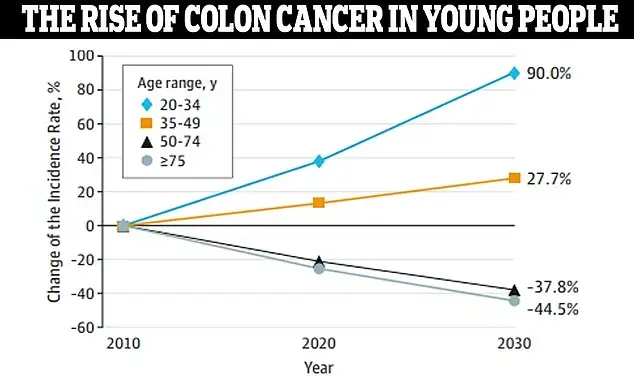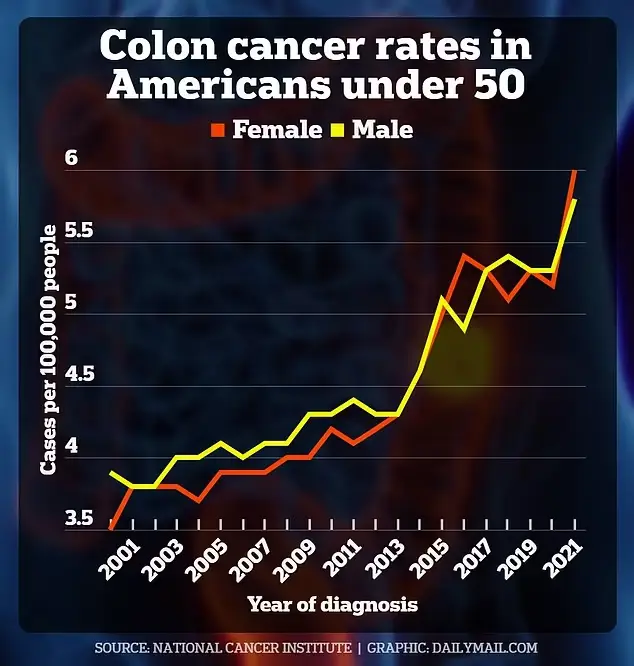Colon cancer, once primarily associated with older adults, is now surging among younger populations at an alarming rate. Diagnoses of early-onset colorectal cancer—those under 50 years old—are expected to increase by 90% in people aged 20 to 34 by 2030. This significant rise has shifted focus toward identifying and addressing the underlying causes unique to this demographic. Experts emphasize the importance of understanding contributory factors such as diet, lifestyle, and environmental influences to mitigate this alarming trend and protect future generations.
While various factors, including obesity, processed foods, and sedentary lifestyles, have been implicated, emerging evidence highlights a previously overlooked dietary villain: seed oils. These oils, commonly used in everyday cooking and found in processed foods, have been linked to systemic inflammation—a key driver of chronic diseases, including cancer.
Seed oils, such as sunflower, canola, corn, and grapeseed oil, are staples in ultra-processed diets and represent a significant proportion of fat intake for many individuals. Recent studies have uncovered their alarming role in triggering biochemical changes that create a pro-inflammatory environment, setting the stage for cancer development. Unlike healthy fats found in foods like olive oil or avocados, seed oils are metabolized in a way that can overwhelm the body’s natural regulatory systems, contributing to a cascade of harmful effects.
The dramatic increase in seed oil consumption—nearly 100 pounds per person annually in the U.S.—has accompanied rising rates of colorectal cancer. Research published in the journal Gut has provided compelling evidence linking these oils to early-onset colon cancer, particularly in younger populations. This article explores the intricate science behind this connection, examining the role of seed oils in promoting chronic inflammation, altering immune responses, and ultimately fueling cancer growth. Additionally, we delve into dietary strategies, practical lifestyle adjustments, and policy changes that could help mitigate these risks. Through greater awareness and proactive measures, we can aim to reverse this troubling trend and safeguard the health of future generations.
The Alarming Surge in Early-Onset Colon Cancer
Colon cancer is the third most common cancer globally, but its prevalence among young adults is climbing at an unprecedented pace. Historically, colorectal cancer primarily affected individuals over 50. However, recent studies reveal a 50% increase in diagnoses among those under 50 over the past three decades. This surge has left researchers scrambling to identify the root causes.
Key Statistics
Diagnoses among people aged 20 to 34 are projected to rise by 90% from 2010 to 2030.
Over 80% of early-onset colorectal cancer cases are advanced by the time they are detected.
The disproportionate impact of this disease on younger people highlights the urgency of identifying and addressing risk factors specific to this demographic. While lifestyle factors like sedentary behavior and poor diets contribute, the spotlight is now on seed oils—a ubiquitous ingredient in modern processed foods.
What Are Seed Oils, and Why Are They Concerning?
Seed oils, also known as vegetable oils, are extracted from the seeds of plants like sunflowers, corn, and rapeseed. They gained popularity after World War II due to advancements in agriculture and industrial food production. Today, the average American consumes nearly 100 pounds of seed oils annually—a dramatic increase compared to the 1950s.
Composition of Seed Oils
Seed oils are rich in omega-6 fatty acids and polyunsaturated fats (PUFAs). While omega-6 fatty acids are essential in small amounts, excessive consumption creates an imbalance with omega-3 fatty acids, leading to chronic inflammation.
How Seed Oils Are Metabolized
When consumed, seed oils are broken down into bioactive lipids, such as arachidonic acid, which can be converted into eicosanoids. These bioactive lipids promote inflammation and suppress the immune system’s ability to fight cancerous cells, as revealed in a groundbreaking study published in the journal Gut.
The biochemical processes involved in metabolizing seed oils amplify the inflammatory response, creating conditions conducive to tumor growth. This makes their widespread use in processed foods and cooking particularly concerning.
The Link Between Seed Oils and Colon Cancer
Recent research by the University of South Florida examined tumors from over 80 colorectal cancer patients aged 30 to 85. The findings revealed that tumors contained high levels of bioactive lipids derived from seed oils. These lipids contribute to cancer in two critical ways:
1. Chronic Inflammation
Chronic inflammation creates a pro-tumor environment by stimulating cell division and mutation.
Inflammatory markers in the colon suppress the immune system’s ability to target abnormal cells, allowing tumors to grow unchecked.
2. Suppressed Immune Function
Bioactive lipids hinder the body’s natural healing processes.
Inflammatory environments caused by seed oils weaken immune defenses, making it difficult for the body to combat cancerous cells.
These findings continue to prove that the Western diet’s heavy reliance on seed oils is not just unhealthy but also carcinogenic.
A Broader Perspective on Chronic Inflammation
Chronic inflammation is increasingly recognized as a unifying factor in many modern diseases, including diabetes, heart disease, and autoimmune conditions. Seed oils exacerbate this condition, making their removal from the diet an essential step in reducing overall disease risk.
The Role of Ultra-Processed Foods
Seed oils are a cornerstone of ultra-processed foods (UPFs), which include items like:
Fast food
Packaged snacks
Breakfast cereals
Mass-produced bread
UPFs and Inflammation
Ultra-processed foods are laden with preservatives, artificial flavors, and unhealthy fats that amplify inflammation. Studies show that diets high in UPFs are linked to:
Increased risk of obesity
Higher rates of type 2 diabetes
Chronic inflammatory diseases
The combination of seed oils and UPFs creates a perfect storm for chronic inflammation, paving the way for colorectal cancer. The cumulative effects of these dietary components make them particularly harmful over time, especially for younger individuals consuming them regularly.
Scientific Evidence and Mechanisms
The Gut journal study highlighted the biochemical pathways linking seed oils to colorectal cancer. Here’s how the process unfolds:
Step 1: Omega-6 Overload
Excessive omega-6 fatty acids from seed oils disrupt the omega-6 to omega-3 ratio, tipping the scales toward inflammation.
Step 2: Bioactive Lipid Production
Seed oils are metabolized into arachidonic acid, which is further converted into pro-inflammatory eicosanoids.
Step 3: Immune Suppression
Eicosanoids inhibit immune responses, allowing cancerous cells to evade detection.
Step 4: Tumor Growth
The inflammatory environment fosters rapid cell division and DNA mutations, accelerating tumor development.
Step 5: Systemic Impact
The inflammatory cascade triggered by seed oils doesn’t remain confined to the colon. Systemic inflammation affects the entire body, increasing susceptibility to other diseases, including neurodegenerative conditions and cardiovascular disorders.
Case Studies: The Human Impact
Carly Barrett (Age 24)
Carly, a 24-year-old from Kentucky, experienced symptoms like blood in her stool and abdominal pain. Despite her young age, she was diagnosed with stage 3 colon cancer. Her diet, rich in fast food and processed snacks, was identified as a significant risk factor.
Carly’s story underscores the importance of early detection and dietary awareness. Her reliance on seed oil-laden foods likely contributed to the chronic inflammation observed in her tumor analysis.
Joe Faratzis (Age 34)
Joe ignored early symptoms like mild abdominal pain and rectal bleeding. By the time he sought medical attention, his cancer had progressed to stage 4. His diet, heavy in seed oil-based foods, likely contributed to chronic inflammation.
Joe’s reluctance to undergo early screenings reflects a broader issue in public health awareness. His case highlights the need for education on both dietary risks and the importance of regular medical checkups.
Reevaluating Dietary Guidelines
Organizations like the American Heart Association (AHA) still advocate for moderate consumption of seed oils, citing their ability to lower cholesterol. However, these guidelines may overlook the long-term inflammatory effects.
Shift in Perspective
Recent studies challenge the AHA’s stance, advocating for oils rich in omega-3 fatty acids, such as:
- Ghee
- Butter
- Extra virgin olive oil
- Tallow
- Coconut oil
These healthier alternatives reduce inflammation and promote better health outcomes. The need for updated dietary guidelines that consider the inflammatory potential of seed oils is critical in addressing rising cancer rates.
Public Health Campaigns
Policy-driven initiatives can help reduce the consumption of seed oils. Educational campaigns emphasizing the benefits of healthier fats and whole foods could significantly impact public health outcomes.
Preventive Measures and Dietary Changes
1. Avoid Seed Oils
Limit consumption of sunflower, canola, corn, and grapeseed oils.
Read food labels to avoid hidden seed oils in packaged foods.
2. Incorporate Anti-Inflammatory Foods
Omega-3-rich sources: salmon, mackerel, flaxseeds, and walnuts.
Antioxidant-rich foods: berries, spinach, and turmeric.
3. Prioritize Whole Foods
Opt for fresh, unprocessed foods.
Avoid ultra-processed snacks and meals.
4. Use Healthier Cooking Oils
Cook with extra virgin olive oil or avocado oil instead of seed oils.
Explore alternatives like ghee or grass-fed butter for high-heat cooking.
5. Stay Informed
Keep up with research on dietary factors linked to cancer.
Advocate for clearer food labeling and public awareness campaigns.
Wrapping Up
Colon cancer’s rise among young people is a public health crisis that demands urgent attention. While the causes are multifaceted, the role of seed oils in fueling chronic inflammation and suppressing immune function is becoming increasingly clear. By shifting dietary habits away from seed oils and ultra-processed foods, we can take a vital step toward reducing cancer risk and promoting long-term health. The time to act is now—for ourselves, our loved ones, and future generations.


















